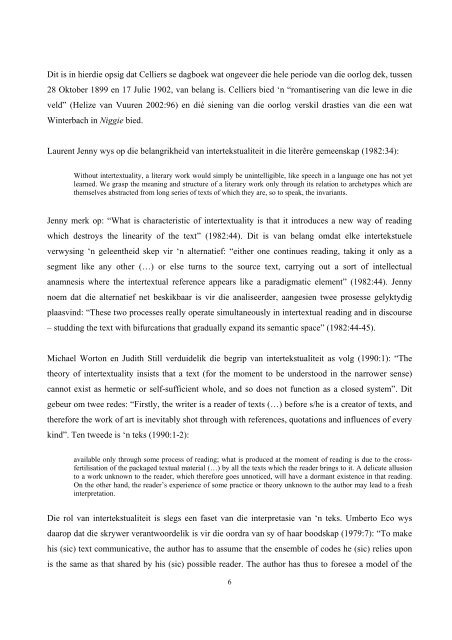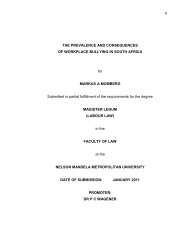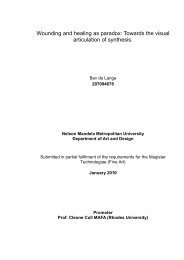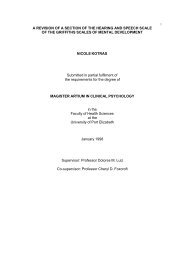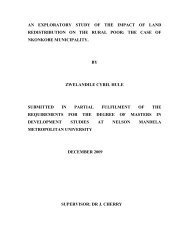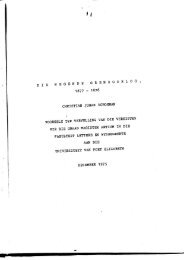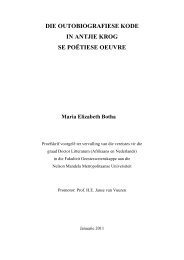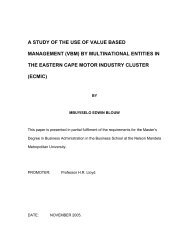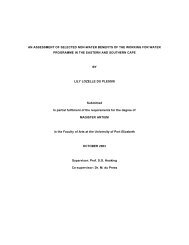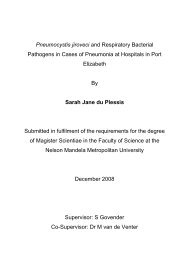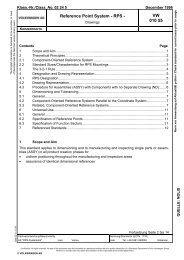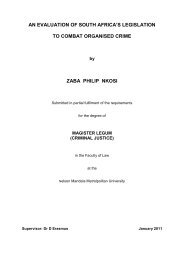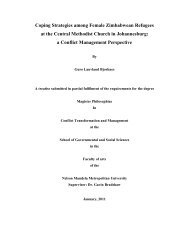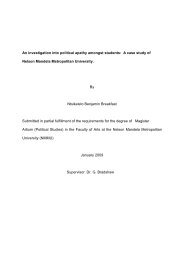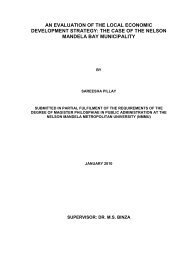Eksperiment en intertekstualiteit: - Nelson Mandela Metropolitan ...
Eksperiment en intertekstualiteit: - Nelson Mandela Metropolitan ...
Eksperiment en intertekstualiteit: - Nelson Mandela Metropolitan ...
Create successful ePaper yourself
Turn your PDF publications into a flip-book with our unique Google optimized e-Paper software.
Dit is in hierdie opsig dat Celliers se dagboek wat ongeveer die hele periode van die oorlog dek, tuss<strong>en</strong><br />
28 Oktober 1899 <strong>en</strong> 17 Julie 1902, van belang is. Celliers bied ‘n “romantisering van die lewe in die<br />
veld” (Helize van Vuur<strong>en</strong> 2002:96) <strong>en</strong> dié si<strong>en</strong>ing van die oorlog verskil drasties van die e<strong>en</strong> wat<br />
Winterbach in Niggie bied.<br />
Laur<strong>en</strong>t J<strong>en</strong>ny wys op die belangrikheid van <strong>intertekstualiteit</strong> in die literêre geme<strong>en</strong>skap (1982:34):<br />
Without intertextuality, a literary work would simply be unintelligible, like speech in a language one has not yet<br />
learned. We grasp the meaning and structure of a literary work only through its relation to archetypes which are<br />
themselves abstracted from long series of texts of which they are, so to speak, the invariants.<br />
J<strong>en</strong>ny merk op: “What is characteristic of intertextuality is that it introduces a new way of reading<br />
which destroys the linearity of the text” (1982:44). Dit is van belang omdat elke intertekstuele<br />
verwysing ‘n gele<strong>en</strong>theid skep vir ‘n alternatief: “either one continues reading, taking it only as a<br />
segm<strong>en</strong>t like any other (…) or else turns to the source text, carrying out a sort of intellectual<br />
anamnesis where the intertextual refer<strong>en</strong>ce appears like a paradigmatic elem<strong>en</strong>t” (1982:44). J<strong>en</strong>ny<br />
noem dat die alternatief net beskikbaar is vir die analiseerder, aangesi<strong>en</strong> twee prosesse gelyktydig<br />
plaasvind: “These two processes really operate simultaneously in intertextual reading and in discourse<br />
– studding the text with bifurcations that gradually expand its semantic space” (1982:44-45).<br />
Michael Worton <strong>en</strong> Judith Still verduidelik die begrip van <strong>intertekstualiteit</strong> as volg (1990:1): “The<br />
theory of intertextuality insists that a text (for the mom<strong>en</strong>t to be understood in the narrower s<strong>en</strong>se)<br />
cannot exist as hermetic or self-suffici<strong>en</strong>t whole, and so does not function as a closed system”. Dit<br />
gebeur om twee redes: “Firstly, the writer is a reader of texts (…) before s/he is a creator of texts, and<br />
therefore the work of art is inevitably shot through with refer<strong>en</strong>ces, quotations and influ<strong>en</strong>ces of every<br />
kind”. T<strong>en</strong> tweede is ‘n teks (1990:1-2):<br />
available only through some process of reading; what is produced at the mom<strong>en</strong>t of reading is due to the crossfertilisation<br />
of the packaged textual material (…) by all the texts which the reader brings to it. A delicate allusion<br />
to a work unknown to the reader, which therefore goes unnoticed, will have a dormant exist<strong>en</strong>ce in that reading.<br />
On the other hand, the reader’s experi<strong>en</strong>ce of some practice or theory unknown to the author may lead to a fresh<br />
interpretation.<br />
Die rol van <strong>intertekstualiteit</strong> is slegs e<strong>en</strong> faset van die interpretasie van ‘n teks. Umberto Eco wys<br />
daarop dat die skrywer verantwoordelik is vir die oordra van sy of haar boodskap (1979:7): “To make<br />
his (sic) text communicative, the author has to assume that the <strong>en</strong>semble of codes he (sic) relies upon<br />
is the same as that shared by his (sic) possible reader. The author has thus to foresee a model of the<br />
6


